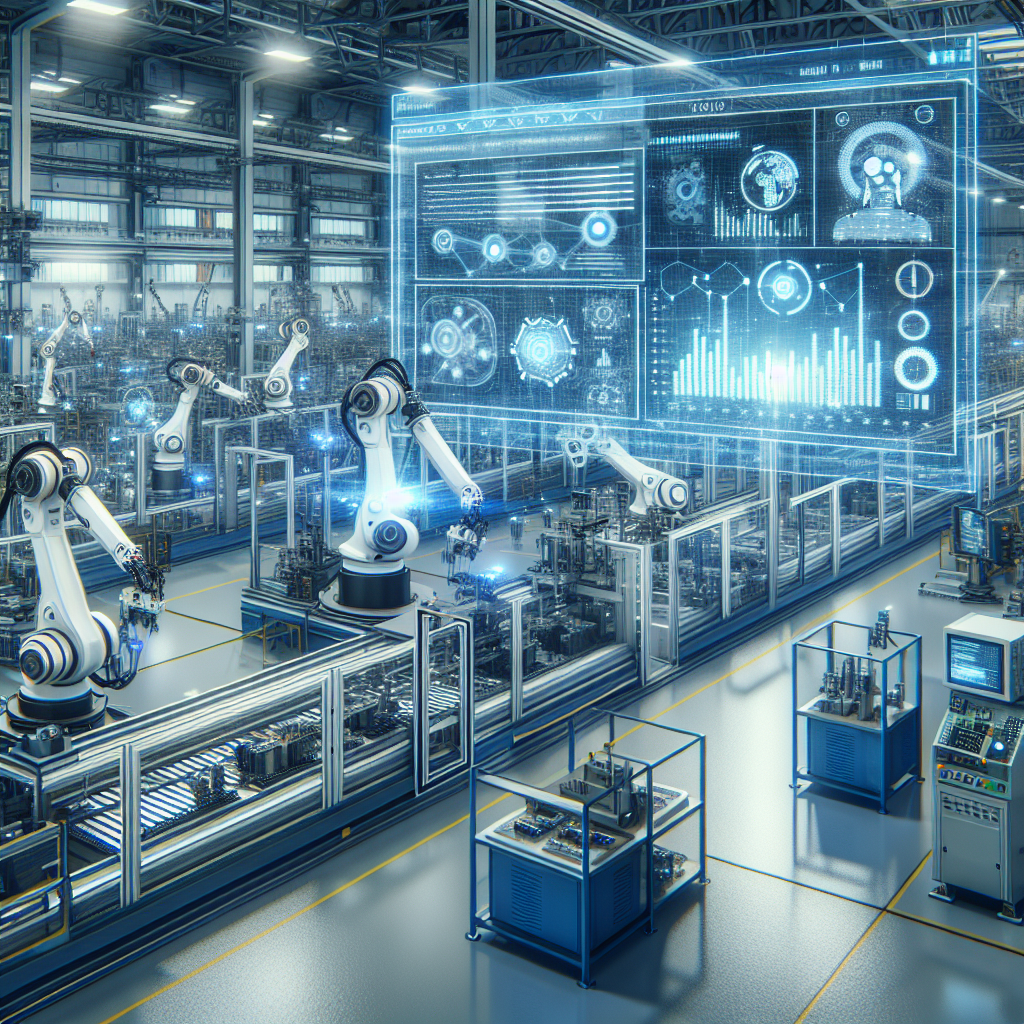Artificial intelligence (AI) is revolutionizing the manufacturing industry by enhancing efficiency in various processes. From predictive maintenance to quality control, AI is helping manufacturers streamline their operations and improve productivity. In this article, we will explore how AI is being used in manufacturing processes and the benefits it brings to the industry.
1. Predictive Maintenance
One of the key areas where AI is making a significant impact in manufacturing is predictive maintenance. By using AI algorithms to analyze data from sensors and other sources, manufacturers can predict when a machine is likely to fail and schedule maintenance before it happens. This proactive approach to maintenance helps reduce downtime and prevent costly breakdowns, ultimately improving overall efficiency in the manufacturing process.
2. Quality Control
AI is also being used to enhance quality control in manufacturing. By analyzing data from sensors and cameras, AI algorithms can detect defects in products with greater accuracy and speed than human inspectors. This not only helps improve the quality of products but also reduces waste and rework, leading to cost savings and increased efficiency in the manufacturing process.
3. Inventory Management
AI can also help manufacturers optimize their inventory management processes. By analyzing historical data and demand forecasts, AI algorithms can predict when and how much inventory to order, helping manufacturers avoid stockouts and overstock situations. This not only improves efficiency in the supply chain but also reduces carrying costs and improves cash flow for manufacturers.
4. Supply Chain Optimization
AI is also being used to optimize supply chain processes in manufacturing. By analyzing data from suppliers, transportation routes, and demand forecasts, AI algorithms can help manufacturers make more informed decisions about sourcing, production, and distribution. This not only improves efficiency in the supply chain but also reduces lead times and improves customer satisfaction.
5. Production Planning
AI can also help manufacturers optimize their production planning processes. By analyzing data from production schedules, machine capacity, and demand forecasts, AI algorithms can help manufacturers schedule production in a way that maximizes efficiency and minimizes downtime. This not only improves productivity but also reduces costs and improves overall profitability for manufacturers.
6. Human-Machine Collaboration
AI is also being used to enhance collaboration between humans and machines in manufacturing processes. By using AI-powered robots and cobots, manufacturers can automate repetitive tasks and free up human workers to focus on more complex and creative tasks. This not only improves efficiency in manufacturing but also improves job satisfaction and retention for workers.
7. Energy Management
AI can also help manufacturers optimize their energy management processes. By analyzing data from sensors and energy usage patterns, AI algorithms can help manufacturers identify opportunities to reduce energy consumption and improve efficiency in their operations. This not only reduces costs but also helps manufacturers meet sustainability goals and reduce their environmental impact.
In conclusion, AI is transforming the manufacturing industry by enhancing efficiency in various processes. From predictive maintenance to quality control, AI is helping manufacturers streamline their operations, reduce costs, and improve productivity. By leveraging the power of AI, manufacturers can stay ahead of the competition and drive innovation in the industry.
FAQs:
Q: How can AI help manufacturers improve efficiency in production planning?
A: AI can help manufacturers optimize production planning processes by analyzing data from production schedules, machine capacity, and demand forecasts. By using AI algorithms, manufacturers can schedule production in a way that maximizes efficiency and minimizes downtime, leading to improved productivity and reduced costs.
Q: What are the benefits of using AI for predictive maintenance in manufacturing?
A: Predictive maintenance using AI algorithms helps manufacturers schedule maintenance before a machine fails, reducing downtime and preventing costly breakdowns. This proactive approach to maintenance not only improves efficiency in the manufacturing process but also helps manufacturers save money on repairs and replacement parts.
Q: How can AI help manufacturers optimize their supply chain processes?
A: AI can help manufacturers optimize supply chain processes by analyzing data from suppliers, transportation routes, and demand forecasts. By using AI algorithms, manufacturers can make more informed decisions about sourcing, production, and distribution, leading to improved efficiency, reduced lead times, and increased customer satisfaction.
Q: What are some examples of AI-powered robots and cobots used in manufacturing?
A: AI-powered robots and cobots are used in manufacturing for tasks such as assembly, welding, and packaging. These robots can collaborate with human workers to automate repetitive tasks and improve efficiency in the manufacturing process. Examples of AI-powered robots include the UR5 robot from Universal Robots and the LBR iiwa robot from KUKA.
Q: How can AI help manufacturers reduce energy consumption in their operations?
A: AI can help manufacturers optimize energy management processes by analyzing data from sensors and energy usage patterns. By using AI algorithms, manufacturers can identify opportunities to reduce energy consumption and improve efficiency in their operations, leading to cost savings and sustainability benefits.

